
“I find no fault in Him at all.” John 18:38
When we think of the Easter story and the events leading to Jesus’ death on the cross, one character we might think of is Pontius Pilate. He’s often depicted as an evil governor who signed Jesus’ death papers and sent the Lord to His execution without giving it much thought. For many people, he’s the other bad guy next to Judas Iscariot.
What if I told you the Bible tells us something very different about Pilate? That maybe he wasn’t such a bad guy after all. Let’s walk through the moments when Jesus stood before Pilate and explore what he was thinking the day our Lord was crucified.
Pilate on Duty
Though Pilate is mentioned in each of the Gospels, the best example of him is in the book of John. Here, we best see his true heart in the middle of the chaos.
As you probably remember, the Sanhedrin was plotting to accuse Jesus of blasphemy and sedition. They knew Jewish law would not allow them to put Jesus to death (John 18:31), so they took Jesus to the local Roman governor, Pontius Pilate, so he could do it.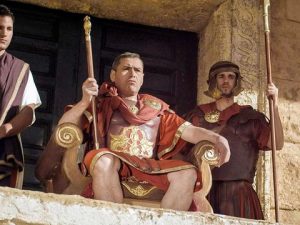
Maybe the Sanhedrin thought it would be a slam-dunk process, but they soon discovered that Pilate isn’t such a pushover. He was a tough Roman who didn’t care to deal with ridiculous Jewish skirmishes. In fact, he was only in Jerusalem because he had been assigned to watch over the city during the Passover in case any riots broke out, which was apparently common.
He didn’t like Jerusalem, and he didn’t like the people. He definitely didn’t want to be there.
Pilate Meets Jesus
The priests were not afraid of Pilate’s surly attitude. They practically begged him to kill Jesus, so Pilate did his duty and began questioning Jesus.
The first time Jesus stands before Pilate, Pilate begins by asking, “Are You the king of the Jews (John 18:33)?” A few moments later he simply asks, “What have you done (v35)?”
Pilate is essentially asking Jesus, “Okay, what’s really going on here? What’s up with the priests?”
Jesus only explains that His kingdom is not of this world. So, Pilate patiently asks Him again, “Are you a king then?” Jesus replies, “You say rightly that I am a king (v37).” The other Gospels quote Him saying, “You say that I am.”
Jesus goes on to say that He had come “to bear witness to the truth (v38).” It’s interesting that Jesus then says, “Everyone who is of the truth hears My voice,” to which Pilate responds with, “What is truth?” Pilate is cynical because he believes there is no clear answer to the question, but what he doesn’t realize is that he is evidently not one of those who is “of the truth.”
Though it’s clear he was not chosen by our heavenly Father to be a follower of Christ, Pilate continues to find no fault in Jesus, so he sends Jesus to Herod who has jurisdiction over Jesus’ home territory.
Herod Meets Jesus
Herod was the son of Herod the Great, the same Herod who killed all the children under two years old after he heard of Jesus’ birth from the wise men. Remember that guy? His son was a chip off the old block.
He questioned Jesus about the charges brought against at the priests’ urging (who had tagged along), but Jesus remained silent (Luke 23:8-11). Remember, there is no sense in engaging with the foolish according to the book of Proverbs.
Jesus’ silence enraged the priests, so Herod took it as an opportunity to mock the Lord and bully Him for a while. Herod put one of his royal robes on Jesus to amuse Pilate and sent Him back to Jerusalem.
Herod too couldn’t find fault with Jesus.
Backward Help
Remember, Pilate is the governor of the region. He could release Jesus if he wanted to. But in order to keep a riot from occurring, he offers to release Jesus according to a Jewish custom that someone imprisoned could be forgiven and set free during Passover (v39). The priests in their stubbornness still demanded Jesus’ death. They cried out, “Not this Man, but Barabbas (v40)!”
Whatever you’ve heard about Barabbas doesn’t easily compare to the truth.
Barabbas was the worst of the worst. It’s like the priests were demanding that Osama bin Laden or Jack the Ripper be released from jail. Any reasonable person should have been scratching their heads and wondering what in the world the priests were thinking. But not wishing to upset the temperamental temple leaders, the people didn’t question it.
Pilate then does something odd. He picks up a whip and begins flogging Jesus. He did not do this to fulfill any laws, but to try to appease the priests and gain their sympathy so they would back down and set Jesus free. It was a super backward way of trying to help Jesus.
The Bible calls what Pilate did “scourging.” It was a horrible, cruel act where the person was stripped naked, tied to a pole, and beaten by several torturers sometimes for hours.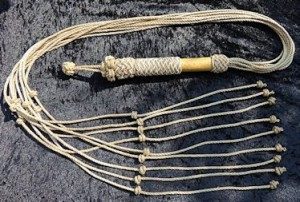
The preferred weapon was a “cat o’ nine tails,” a wooden rod that has usually nine leather straps attached to it, and to each strap was a hooked bone or sharp piece of metal on the end. The weapon was so evil it usually ripped open a person’s body right down to the bone exposing muscles and veins. And blood. Lots of blood. Most victims died, but if someone lived, they were sent straight to execution.
It was during this flogging that the soldiers put a purple robe over Jesus’ ripped up shoulders (one different from what Herod put on Him) and a crown of thorns on His head (John 19:2).
Jesus’ Forgiveness
Jesus miraculously survived the brutal beating, but it did not sway the priests. They still demanded Jesus’ crucifixion. Again, Pilate tells the priests to do it because he found no fault with Jesus. That’s when the priests dropped a bomb.
“The Jews answered [Pilate], ‘We have a law, and according to our law He ought to die because He made Himself the Son of God.” (John 19:7)
This stops Pilate in his tracks. Here was a man he just flogged to near death, and this man is claiming to be the Son of God. Romans were highly superstitious, and, if Jesus’ claim was true, He might send down a curse or vengeance on Pilate. Pilate was suddenly very scared and nervous, so he goes back to Jesus one more time.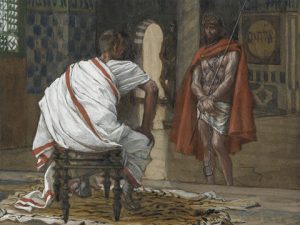
“Where are You from?” Pilates asks. Jesus doesn’t answer, presumably because He’s been beaten to a pulp and has no energy. Jesus’ silence angers Pilate, who is desperate at this point to get out of the situation.
“Are You not speaking to me? Do You not know that I have power to crucify You, and power to release You?” (John19:10)
Jesus, in His usual compassion, lets Pilate off the hook and tells him his authority is only given to him by God (v11). In other words, Jesus is saying He understands Pilate is just doing his job. Jesus’ forgiveness makes Pilate believe even more that Jesus is innocent.
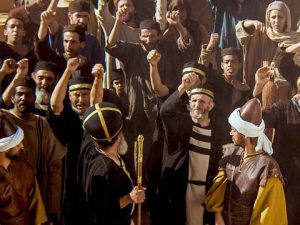
So again Pilate tries to release Jesus, but the people by then had been fully seduced by the priests into calling for His death. The crowd also taunts Pilate and tells him he’s no friend of Caesar’s, and that anyone who claims to be a king is blaspheming Caesar (who proclaimed to be a divine god).
Oh yeah, the boss, Caesar. Can’t upset him. Pilate had to think of his job too.
Pilate’s Last Attempt
Pilate makes a fourth attempt to free Jesus.
He goes out to the crowd one last time and asks, “Shall I crucify your King (v15)?” I can only imagine he was silently hoping/praying they’d say no. But no. The priests again call for Jesus’ death.
The book of Matthew records that at this moment, Pilate’s wife suddenly appears begging him to let Jesus go because of a dream she just had.
“While Pilate was sitting on the judge’s seat, his wife sent him this message: “Don’t have anything to do with that innocent man, for I have suffered a great deal today in a dream because of him.” Matthew 27:19
Pilate is clearly getting more nervous now. He’s afraid of making the wrong move. But he knows he must keep the peace, and he must keep his job, so he reluctantly allows Jesus to be crucified.
Pilate knows he’s lost the fight, but he makes one last move to honor an innocent man. He also wants to embarrass the priests. He writes on a plank of wood “JESUS OF NAZARETH, THE KING OF THE JEWS (v19).” For full effect, he writes it in Hebrew, Greek, and Latin just to be sure everyone can read it. It was Pilate’s way of taking revenge on the priests for intimidating him into killing Jesus.
Of course, this super upset the priests who, as we’ve already seen, have no trouble whining and complaining. So, they go back to Pilate asking (or begging or demanding, we’re not sure) that Pilate please not write those words and that it should rather read, “He said, ‘I am the King of the Jews (v21, my emphasis).”
Pilate simply and, I imagine, firmly answers, “What I have written, I have written,” and promptly dismisses them (v22). He was fed up and done with the whole situation. He had been cajoled and intimidated into killing a man he knew was innocent. His heart was heavy for it, and he was downright angry. No doubt his disdain for the Jews intensified that day.
It’s All Part of the Plan
If we look closely at Pilate, we can see that he has some character flaws, but deep down he was a guy who just wanted to do the right thing. Four times he tried to save Jesus, but four times the priests pressured and manipulated him into getting what they wanted.
Now, before you start pointing fingers at the priests and the Jewish crowd, we need to remember that all this was planned from before the beginning of time. We must remember that everything Jesus went through that day was exactly why He had come to the earth in the first place. He even says so in John 18:37.
When Jesus was first being tried before Pilate who asks Him if He’s a king, Jesus replies,
“You say rightly that I am a king. For this cause I was born, for this cause I have come into the world, that I should bear witness to the truth. Everyone who is of the truth hears My voice.”
Jesus was sent to earth to take on human flesh and pay the penalty of death for the sins of the entire world. It was planned long, long ago, and Jesus was happy to do it because of His great love for His people.
Born to Die
Jesus came to die for us. It’s that simple. The events of the day of His death were foreknown by Him and by the Father, which is why Jesus sweated blood the night before His arrest (Luke 22:44). He was extremely nervous, but remember He said, “Nevertheless, not My will, Father, but Yours be done (Luke 22:42).”
Jesus fully expected everything that happened, and He knew it must happen or else there would be no redemption of sin. Without that redemption, that payment of death, there would never be hope for heaven for any of us. That would break God’s heart.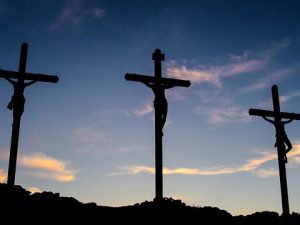
While the priests were indeed evil in their hearts, all of it had to happen. It’s unfortunate Pilate had to be the one to give permission for Jesus to die. I can only imagine his frustration, anger, and despair. But what he didn’t realize was that he was fulfilling Biblical prophecy and helping to make way for all sinners to find forgiveness and hope. Sinners like you and me.
So maybe he wasn’t such a bad guy after all. Maybe instead we ought to thank the Lord this Easter for using Pilate to help make His plan so overwhelmingly successful.
Further Reading
There is a lot of interesting historical information about Jesus’ triumphant entry into Jerusalem on Palm Sunday, specifically the gate He entered. It’s more amazing fulfilling of prophecy. Hosanna! Click here to read The History and Prophecy of the Triumphant Entry Gate.
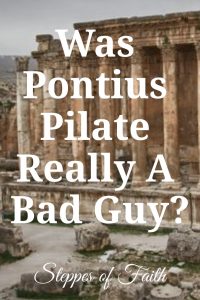
Thank you for this article. I taught a Sunday School class today and this very question came to my mind, was Pilate a bad person. I’ll share what you shared – thanks again
Friend, whoever you are, thank God for putting this in your heart and thank you for sharing it with us. Such a refreshing perspective. One that seems closer to the truth and more sincere than anything that I’ve ever heard being said about this man-who history has treated so harshly and unfairly. I think we need this kind of help to get off our high horses and get a closer look at what he was dealing with
Thank you for your kind words. God has challenged me to speak truth and teach others. I’m so glad I could be a blessing to you. Hope you stop by again.
Great article! I have heard stories that Pilate became a Christian before he was ordered to commit suicide by Caligula. There are many stories about what happened to Pilate, so it is not certain. But he is called a saint by Ethiopian Christians.
Wow! I never knew that! If he did become a Christian (and I pray he did), it surely was because of his encounter the day Jesus was crucified. Praise God not even Caligula could stop Pilate’s salvation. Thanks so much for teaching me today. God bless!
Thank you so much for your analysis of Pontius Pilate! I knew he really wasn’t a bad guy, but a person put into place by God to fulfill God’s will at this particular time. Sadly, Pilate really would never understand that. God bless you –
God bless you, Janene. Thanks so much for reading!
This is an interesting post in that it gets readers to consider the whole narrative and Pilate’s role within in that entire narrative. Yet, one can’t help feel that there are always choices for people in God’s eternal narrative. Choices to follow or not follow Jesus. And while there are earthly costs to following Jesus, there are also beautiful, eternal benefits that far outweigh the earthly costs or negative outcomes. There are some obvious parallels in this narrative to today – in that many who are faced with the hard decision about whether to follow Christ or follow an earthly leader – oftentimes still decide to appease the earthy leader(s) just as the people of Jesus’ day chose to do. “But not wishing to upset the temperamental temple leaders, the people didn’t question it.” Also, while Pilate did try to find a compromise that would allow him to keep the peace by appeasing the Jewish leaders and to keep Jesus alive – when faced with choices of following Jesus and his conscience or keeping his boss happy and keeping his job – he chose the latter, the things of this world. Yet, as you write, Pilate decisions, the Jewish leaders’ desires to seek Jesus’ death, and the people’s desire to not offend the leaders were all used for God’s intended greater eternal purpose. It is interesting how God uses everything for his purposes and greater glory.
Amen, Anne. You’re absolutely right. So many people are like sheep gone astray and so easily give in to worldly leaders instead of keeping their eyes on Jesus. They either don’t care or fail to see the consequences of not following the Lord. Thankfully, we can rejoice that God works all things for His glory and for our betterment just as you say. I appreciate your thoughts. Have a blessed Easter!